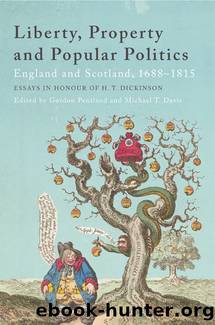Liberty, Property and Popular Politics by Pentland Gordon;Davis Michael;

Author:Pentland, Gordon;Davis, Michael;
Language: eng
Format: epub
Publisher: Edinburgh University Press
CHAPTER 8
Thomas Spence and James Harrington: A Case Study in Influence
Stephen M. Lee
This essay will attempt to identify the extent to which the political thought of Thomas Spence (1750â1814) was influenced by the works of James Harrington (1611â77). In his introduction to The Political Works of Thomas Spence, Harry Dickinson noted that Spence âwas much influenced not only by the Bible, but by the idealised societies of Thomas Moreâs Utopia and James Harringtonâs Oceanaâ, and âaccepted James Harringtonâs thesis that political power was derived from the possession of property, especially landed propertyâ.1 Other scholars have also identified the influence of Harrington, although they have been divided over its extent. Malcolm Chase argued that âmuch of the distinctiveness of Spenceâs thought was derived .â.â. from .â.â. James Harringtonâ, most particularly in his âconcern to isolate property in land as the key to political powerâ.2 Chase, in addition, noted that both Spence and Harrington also:
confidently shared a belief that landed property was capable of a meaningful and enduring redistribution. Likewise, they were dismissive of the claims of mobile property to form the basis of political citizenship or national fortune or stability. The terms in which this belief was expressed by Spence suggest a close acquaintance with Harringtonâs work.3
As further evidence of this âspecial affinityâ, Chase highlighted the similarity between the names of the âallegorical societiesâ that the two authors imagined (Oceana and Crusonia/Spensonia), noted that Spence read from Harringtonâs work at his trial in 1801, and reminded the reader that in Pigâs Meat â Spenceâs weekly journal that ran from 1793 to 1795 and consisted largely of extracts from other writers â the writer most often quoted was Harrington.4 Earlier work had drawn similar connections, and G. I. Gallop stated that âJames Harrington was a major influence on Spenceâ, while Olive Rudkin identified âone writer who had a real influence upon Spence, and he is James Harringtonâ.5 Thomas R. Knox, however, was more cautious and, while he conceded that Harrington is the only writer towards whom Spence might possibly display a âhint of a significant debtâ, he argued that in general Spence used a somewhat limited knowledge of English political theorists âto legitimate, not to inspireâ his own ideas.6
Overall, with the partial exception of Chase, the direct or indirect influence of Harrington on Spence has been asserted rather than demonstrated in a literature that has been more concerned with Spenceâs own influence on later radicals.7 This essay therefore aims to provide a more systematic account of the relationship between Harrington and Spence. Any such inquiry must begin with some brief consideration of the methodological problems to which the concept of âinfluenceâ gives rise. Quentin Skinner has given detailed attention to the problems of attempting to identify the influence of one writer or text on another and highlights a danger especially relevant to the Harrington/Spence example:
An argument in one work .â.â. may happen to remind the historian of a similar argument in an earlier work, or may appear to contradict it. In either
Download
This site does not store any files on its server. We only index and link to content provided by other sites. Please contact the content providers to delete copyright contents if any and email us, we'll remove relevant links or contents immediately.
| Africa | Americas |
| Arctic & Antarctica | Asia |
| Australia & Oceania | Europe |
| Middle East | Russia |
| United States | World |
| Ancient Civilizations | Military |
| Historical Study & Educational Resources |
Machine Learning at Scale with H2O by Gregory Keys | David Whiting(3778)
Never by Ken Follett(3605)
Fairy Tale by Stephen King(3044)
The Man Who Died Twice by Richard Osman(2868)
Oathbringer (The Stormlight Archive, Book 3) by Brandon Sanderson(2730)
Will by Will Smith(2642)
Rationality by Steven Pinker(2184)
The Dark Hours by Michael Connelly(2131)
The Dawn of Everything: A New History of Humanity by David Graeber & David Wengrow(2051)
Friends, Lovers, and the Big Terrible Thing by Matthew Perry(2039)
Can't Hurt Me: Master Your Mind and Defy the Odds - Clean Edition by David Goggins(2031)
Principles for Dealing With the Changing World Order: Why Nations Succeed and Fail by Ray Dalio(1925)
HBR's 10 Must Reads 2022 by Harvard Business Review(1713)
A Short History of War by Jeremy Black(1692)
Go Tell the Bees That I Am Gone by Diana Gabaldon(1611)
515945210 by Unknown(1532)
Kingdom of Ash by Maas Sarah J(1438)
A Game of Thrones (The Illustrated Edition) by George R. R. Martin(1428)
443319537 by Unknown(1408)
